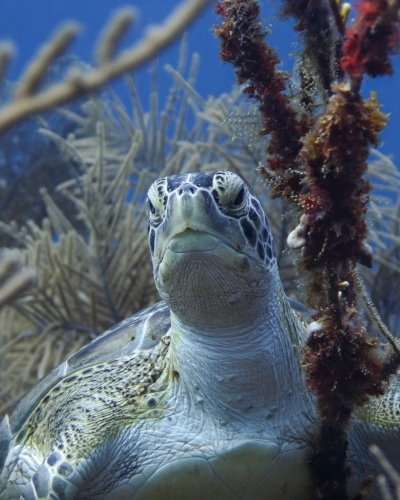Roatan is often overlooked on the map, but for divers it is arguably one of the best overall Caribbean destinations. There are plenty of reasons to dive this Honduran island, but these are my top 5.
Viewing entries in
Conservation
During every night dive in Roatan, especially on a new moon, we stage a “lights out time”, during which the whole group kneels in the sand together and switches off all our torches…
The whole reef was coral sex...and we were swimming in it.
Lionfish is a readily available fish throughout the southeastern coastal US, the Gulf and the Caribbean. Due to its status as an invasive species, it is also an excellent option for eating. It is versatile, delicious, healthy and a great way to promote responsible fishing and seafood practices. One of my favorite ways to prepare lionfish is in a ceviche, so here is my signature recipe for a Killer Lionfish Ceviche!
Since my homecoming to the Caribbean, I’ve found myself experiencing an inner conflict whenever I see a lionfish. On one hand, I feel a responsibility as an able conservation partner to help control an invasive species that is so destructive; on the other hand I feel for the lionfish. The malice is gone and all that is left is grief knowing such a stunning example of nature is in such a terrible position thanks to the ignorance of humans.
I love something misrepresented, misunderstood and generally misconceived. Of all the things I’ve seen in the water, sharks are the most graceful, discerning, and beautiful. They radiate finesse, power and restraint. They are living fossils, inhabiting Earth for longer than trees have been around, and have changed little since the dawn of their existence. They have supernatural abilities, 7 senses to our 5, arguably more common sense than us and undeniably serve a more positive and important role in the environment than we do.
So why does a man who was has every reason to fear and hate sharks advocate getting in the water with them? The reason lies in the life history and role that sharks play in nature. They are of critical importance to the health of the ocean, and therefore to our own health, and they are currently in dire straits.
As many of your feeds may have been showing you recently, the growing amount of plastic waste is becoming readily evident in many circles of our daily lives. From the infamous video of good samaritans pulling a plastic drinking straw from the nose of a sea turtle, to the recent report showing that by 2050 our oceans will contain more weight in plastic waste than fish (1), it’s becoming apparent, and frankly hard to ignore, that our obsession with disposable plastic products is a problem. Luckily, humans are resourceful, creative and I believe largely good at heart, and there are some simple ways we can all be part of a solution, and by making only small changes to our daily lives.
Ask anyone what they are afraid of when they enter the ocean, and thanks to Steven Spielberg and Discovery Channel, many people have the same answer… sharks. Now ask someone who has been in the water with sharks what they would most like to see when they enter the ocean, and I can assure you many, maybe 9/10 of them, will have the same answer… sharks. So what’s the deal with the disparity?








